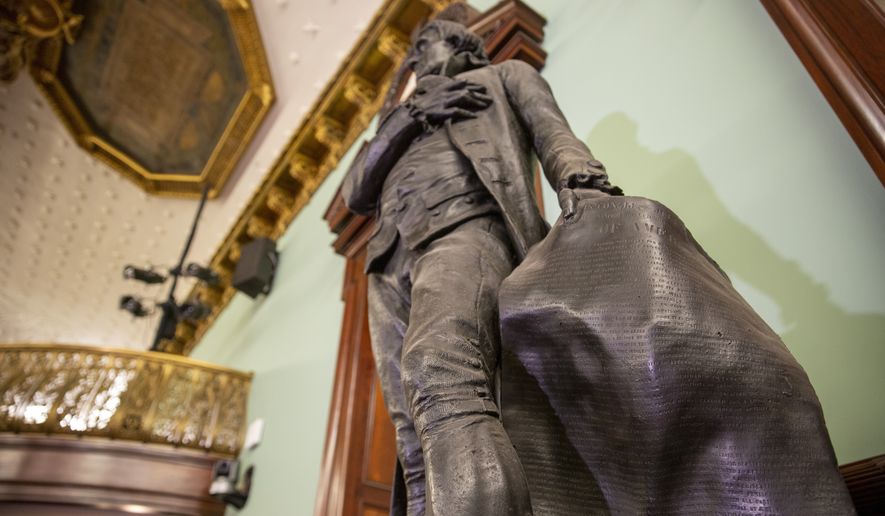OPINION:
The New York Public Design Commission voted unanimously last week to remove a seven-foot-tall statue of the third President of the United States, Thomas Jefferson. The statue, which has called city hall home since 1834 and has been in the New York City Council chambers for more than a century, was specifically intended to honor Mr. Jefferson’s writing of the Declaration of Independence, a document that literally changed the world.
Politically correct New York City officials aren’t so sure Mr. Jefferson’s authoring of the Declaration warrants recognition or celebration, however. Instead, they wish to cancel Thomas Jefferson.
Why?
Councilperson Adrienne Adams offered that Mr. Jefferson had to go because he “embodied some of the most shameful parts of our country’s long and nuanced history.”
Was it shameful when Mr. Jefferson served in the Virginia state legislature?
Was it shameful when he was a leading figure in the Continental Congress? Does Ms. Adams feel shame that Mr. Jefferson was Governor of Virginia? Was it shameful when Mr. Jefferson was the U.S. Minister to France? Was it shameful when Mr. Jefferson served as U.S. Secretary of State? Perhaps it was his time as Vice President of the United States that she finds shameful.
Is the councilwoman shaming the American voters who chose Mr. Jefferson as President of the United States, not once, but twice? Perhaps she isn’t aware that during his two terms in office, the U.S. purchased the Louisiana Territory, generally recognized as the most important American step toward expansion.
Maybe New York City finds it shameful that in retirement Mr. Jefferson helped found the University of Virginia, which is recognized to this day for educational excellence. In 2021, the University was ranked fourth best public university in the country by U.S. News & World Report.
Councilperson Adams was not alone in her raging criticism of Jefferson. Assemblyman Charles Barron has been a loud and frequent voice in trying to rid New York City of Thomas Jefferson for years. He offered the following, “When we remove this statue, we’re making a step in the right direction for erasing honoring of those who murdered and raped us.”
Let’s be clear. There is no evidence of Mr. Jefferson murdering or raping anyone.
Some will say that because Sally Hemings, a slave, bore her first child with Mr. Jefferson when she was just 16, that she could not consent and thus was raped. That ignores the common practices of the era. According to Everyday Life in Colonial America: From 1607-1783, a publication by Dale Taylor, “Ladies living in the South during this period could marry as young as fourteen.”
It also ignores the fact that Mr. Jefferson was widowed when his 33-year-old wife Martha died during childbirth. In Colonial times it was not uncommon for a widower to marry his wife’s sister. Ms. Hemings was the half-sister of Mr. Jefferson’s deceased wife. Ms. Hemings had six children, all of whom are believed to have been fathered by Mr. Jefferson. Ms. Hemings was half black and half white, thus she and Jefferson weren’t officially married but toss in the fact that archeologists have determined an area in former President Thomas Jefferson’s plantation home immediately adjacent to the president’s bedroom was the living quarters of Sally Hemings and you get the picture of a romance centuries ahead of its time.
While manufacturing alleged misdeeds, cancel culture simultaneously ignores the many achievements of Mr. Jefferson, among them the elimination of the transatlantic slave trade to the United States and the creation of a free Midwest, a direct result of a 1784 Jefferson proposal to ban slavery in all territories west of the Appalachians.
Perhaps the best piece of evidence that cancel culture has it all wrong on Thomas Jefferson is his 1806 State of the Union Address as President of the United States. He speaks on foreign affairs, domestic militias and on budget issues. He also addresses the issue of slavery head-on.
President Jefferson said, “I congratulate you, fellow-citizens, on the approach of the period at which you may interpose your authority constitutionally, to withdraw the citizens of the United States from all further participation in those violations of human rights which have been so long continued on the unoffending inhabitants of Africa, and which the morality, the reputation, and the best interests of our country, have long been eager to proscribe.”
Mr. Jefferson also covered relations with Native Americans in clear and cooperative terms during that same State of the Union speech, “We continue to receive proof of the growing attachment of our Indian neighbors, and of their disposition to place all their interests under the patronage of the United States. These dispositions are inspired by their confidence in our justice, and in the sincere concern we feel for their welfare; and as long as we discharge these high and honorable functions with the integrity and good faith which alone can entitle us to their continuance, we may expect to reap the just reward in their peace and friendship.”
Was Mr. Jefferson a flawed man? Indeed, as are we all, but to try to erase his outstanding and important contributions to our nation and to western civilization as a whole would be absolutely foolish.
The foolishness, of course, is nothing new to the elected officials of New York City.




Please read our comment policy before commenting.